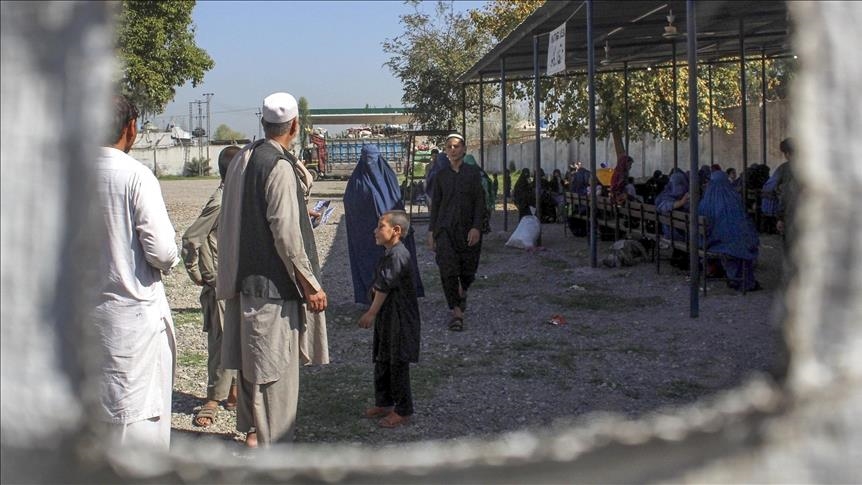OIC to set up humanitarian trust fund for Afghanistan
Fund to be established under aegis of Islamic Development Bank, says OIC secretary general
 File Photo
File Photo
KARACHI, Pakistan
The Organization of Islamic Cooperation (OIC) on Sunday announced and suggested a string of steps to mitigate a looming humanitarian crisis in Afghanistan.
This came at a day-long "extraordinary session" of the organization on Afghanistan held in Pakistan's capital Islamabad, and attended by the foreign ministers of the member states, and representatives of the UN, US, UK, Germany, Japan, Italy, and several international organizations.
Afghanistan’s delegation, led by acting Foreign Minister Amir Muttaqi, also attended the huddle, which was convened against the backdrop of the aggravating humanitarian situation in the country.
Announcing the decisions at a joint news conference at the conclusion of the session, Pakistan's Foreign Minister Shah Mahmood Qureshi together with the OIC's Secretary General Hissein Brahim Taha, said a "humanitarian trust fund" will be established to help Afghans in terms of humanitarian assistance.
The fund will be established under the aegis of the Islamic Development Bank to serve as a vehicle to channel humanitarian assistance to Afghanistan including in partnership with other international actors.
The conference, he said, has agreed to launch a food security program for Afghanistan in order to mitigate the growing food shortages in the country.
Also, he added, the OIC will appoint a special representative for Afghanistan to coordinate aid and assistance efforts. The representative will also be mandated to pursue economic and political engagement with Kabul.
Insisting that the international and UN Security Council sanctions should not impede the provision of the humanitarian aid, the conference called for unlocking the financial and banking channels for Afghanistan.
"The need is felt to forge a partnership between the OIC and the UN to channelize the resources to be pledged in terms of humanitarian assistance (for Afghanistan)," Qureshi said.
Responding to a question, Taha clarified that no amounts have so far been pledged for the OIC's humanitarian fund. According to the UN’s estimates, some 60% of Afghanistan’s 38 million people face “crisis levels of hunger”, which is getting worse "every day".
‘Biggest man-made crisis’
Earlier, addressing the opening session of the conference, Pakistan's Prime Minister Imran Khan warned that Afghanistan could potentially become the "biggest man-made crisis" if the world does not take steps to contain the tragedy.
Urging the US to "delink" the Taliban government from the 40 million Afghan citizens, Khan said that Afghanistan was headed for chaos, which means the inability to fight terrorism and resurgence of terrorist groups, such as Daesh/ISIS.
"Such a situation will not suit the US," he warned.
Saudi Foreign Minister Faisal bin Farhan Al Saud, in his address, feared that the simmering economic crisis could trigger a humanitarian crisis, which subsequently will lead to further instability, and impact the regional and international peace.
He urged the OIC member states to play a role to prevent an economic collapse.
Joint declaration
According to the UN High Commission for Refugees, some 665,000 people have been newly displaced within Afghanistan between January and September 2021 – in addition to the 2.9 million people already internally displaced by conflict in Afghanistan.
A joint declaration adopted by the meeting reaffirmed "strong" commitment of the OIC member states to the "sovereignty, independence, territorial integrity and national unity" of Afghanistan.
The declaration underlined the importance of investing in human development for achieving sustainable peace and development in the country.
It expressed solidarity with the people of Afghanistan and reiterated the commitment of the OIC member states to help bring peace, security, stability, and development to the country.
The meeting also expressed "deep alarm" at the deteriorating humanitarian crisis in Afghanistan, in particular the warning issued by the World Food Program that 22.8 million people – more than half the population of Afghanistan – face acute food shortage; 3.2 million children and 700,000 pregnant and lactating women are at a risk of acute malnutrition.
Noting with “deep concern” the breakdown of Afghanistan’s health system, disease outbreaks and severe malnutrition, in particular in the face of COVID-19 pandemic, the meeting warned that an economic meltdown in Afghanistan would lead to a mass exodus of refugees, promote terrorism and instability, with dire consequences for regional and international peace and stability.
The meeting called upon the international community to provide urgent, and sustained humanitarian assistance to Afghanistan as well as to the major Afghan refugee-hosting countries.
It decided that the OIC will play a leading role in the delivery of humanitarian and development aid to the people of Afghanistan.
It was also decided that the OIC General Secretariat, together with the Islamic Development Bank and humanitarian trust fund, will commence discussions with the UN system organizations to devise a road map for mobilizing actions in relevant fora to unlock the financial and banking channels to resume liquidity and flow of financial and humanitarian assistance, and to devise a mechanism for the disbursement of urgent and sustained humanitarian assistance to the people of Afghanistan.
The declaration also called on the OIC member states, the Islamic financial institutions, donors and other international partners to announce pledges to the humanitarian trust fund for Afghanistan as well as to provide humanitarian assistance to Afghanistan.
Anadolu Agency website contains only a portion of the news stories offered to subscribers in the AA News Broadcasting System (HAS), and in summarized form. Please contact us for subscription options.






